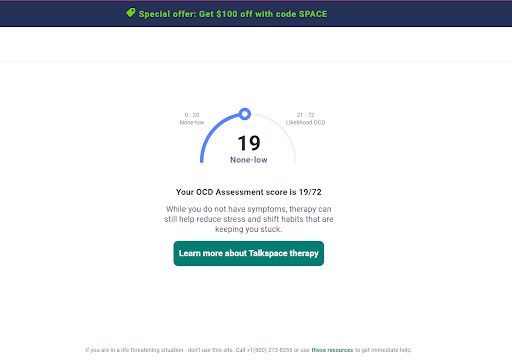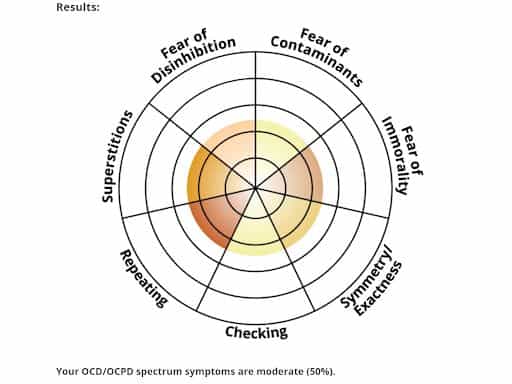
If you or your therapist feel you may have some warning signs for Obsessive Compulsive Disorder (OCD), you might want to consult an online resource.
IDRLabs and Talkspace offer excellent options for OCD online tests. Both tests were designed by experienced mental health professionals, providing valuable insight into your OCD symptoms.
However, you should consider the critical differences between these two tests before deciding which is best.
Though neither test will replace a formal diagnosis by a licensed professional, we compared the IDR Labs OCD Test and Talkspace OCD Test to help you decide which is better.
Switch to the top-rated therapy platform.
IDR Labs vs. Talkspace OCD Test: Our Verdict
Talkspace’s online test is the better option compared to IDR Labs.
While both tests provide helpful information and insight, Talkspace offers more personalized suggestions regarding your results and where to find help.
IDR Labs does not guide you after you receive your results. The IDR Labs test shows the user descriptions of common traits and habits associated with OCD. However, they do not offer recommendations or links to treatment resources.
Talkspace is the better option for most people as you’ll receive guidance on how and where to receive help immediately after receiving your results.
How do online OCD tests work?
Online OCD tests work by asking the user to self-report symptoms. The tests ask you to respond to a series of statements using the Likert Scale.
After responding to all the statements, you can access your results. You receive a score that represents where you fall on the OCD spectrum. These results do not diagnose but rather inform the client of possible OCD tendencies or habits.
Taking an online OCD test can be a terrific first step for those looking to assess the severity of OCD. Online quizzes are quick and convenient, allowing users to self-evaluate privately without stigma.
Additionally, online OCD can give valuable insight into how one’s symptoms may have changed over time.
Though these tests are easy, fun, and engaging, you should use them under the supervision of a mental health professional. There are many places to find professional help regarding OCD and other anxiety disorders. Therapy and treatment include in-person and online treatment with sites such as BetterHelp and Talkspace.
Talkspace OCD Test

You can find the Talkspace OCD test on the Talkspace website. Talkspace has included encouraging statistics and an FAQ section on the page designated for the test.
Users then take a short questionnaire that requires them to respond to certain statements with degrees of agreement ranging from “not at all” to “extremely.”
After taking the test, users enter their email addresses to access their specified results. The OCD result is a score out of 72.

Talkspace uses tests to link customers to the right therapy and mental health professionals while giving them insight into their mental health. Talkspace reminds users that they don’t need to score high on the OCD test to seek therapy.
The test was easy to access and complete. Talkspace included some questions expected from an OCD test, such as “I feel compelled to count while I’m doing things.” They also included questions that expand understanding of OCD, such as “I have trouble controlling my thoughts.” The test provided a new perspective on OCD.
Taking this test is an engaging way to initially address concerning thoughts or feelings and determine if they are symptoms of OCD.
Switch to the top-rated therapy platform.
IDRLabs OCD Test
The IDR Labs OCD Test is similar Talkspace test. Test takers respond to a series of statements using the Likert Scale. The responses range from “strongly disagree” to “strongly agree.”

After completing the test, users are given their results in a graph and an explanation for each category. IDR explains each facet of OCD shown in the chart in detail just underneath the results. These results indicate a larger spectrum of information than the Talkspace test. However, it is a little difficult to interpret the findings. They present results in a percentage, but no scale or statistic helps the user understand the percentage.
The test feels like a personality test. Most questions address specific aspects of OCD, but they also repeat and rephrase questions as if they are testing the user’s ability to self-report.
After completing the test, it is easy to connect the questions and the facets of OCD. The answer to the question “I am often worried that my actions are deserving of criticism” would affect the Fear of Immorality metric. However, this is not clearly explained before, during, or after the test.
Additionally, there is little instruction regarding how the results can to used in the future.
Next Steps: OCD Diagnosis & Therapy
Now that you have your results from the online OCD test, what happens next?
For those looking for a therapy option for their Obsessive Compulsive Disorder (OCD), several in-person and online choices are available.
Online therapy, such as Talkspace, is becoming increasingly popular because of its convenience and affordability. Clients can access the established treatments for OCD in the comfort of their homes. A licensed online therapist, including Cognitive Behavioral Therapy (CBT), can provide excellent care.
CBT is an effective therapy for treating Obsessive Compulsive Disorder (OCD). CBT involves meeting regularly with a trained therapist to identify and challenge patterns of unhelpful thoughts and behaviors.
Some of the other benefits of OCD therapy are:
- Specified plan for treatment
- Improved quality of life
- Increased self-confidence
- Reduced anxiety and stress
- Better relationships with family, friends, and colleagues
- Increased ability to focus on tasks without distractions or obsessions
The best thing to do if you suspect you have OCD or any anxiety disorder is to contact a mental health professional. Online tests and self-assessments can be a helpful step in the right direction but do not replace professional diagnosis.
No matter which therapy option you choose, remember that seeking treatment is always the best way forward when it comes to addressing all mental health issues.
- Escalaphobia: Conquering Moving Mountains, One Step at a Time - December 19, 2024
- How Psychologists Can Empower Communities - March 25, 2024
- The Potential of Medical Cannabis for Neurological Conditions - February 26, 2024

